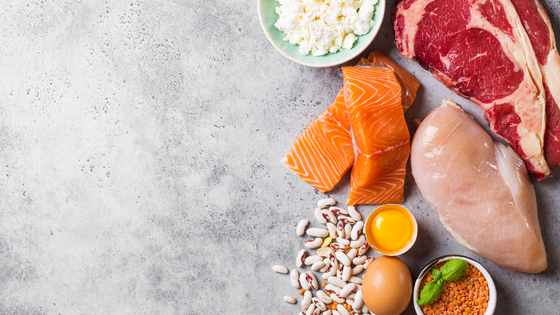
What is muscle synthesis?
The term ‘muscle synthesis’ is often used in the fitness world, without a clear explanation or understanding of the biological mechanisms.
Muscle tissue continually forms and breaks down in adults. This ensures the renewal of degraded muscle proteins. In most cases, loss and growth are balanced and muscle mass therefore remains stable.
The first step in optimising lean muscle mass is to optimise protein synthesis. This is directly influenced by diet: a suitable diet provides the body with the nutrients needed to build muscle. It also provides the energy required for efficient training, which stimulates muscle synthesis.
Protein, a key element in muscle synthesis
As proteins are the main components of muscle fibres, protein synthesis plays an important role in building muscle mass. Stored muscle protein leads to an increase in the volume of muscle fibres.
To optimise muscle synthesis, two factors are therefore decisive: stimulating the muscles through training and ensuring a sufficient intake of good-quality protein through diet.
Protein synthesis is the process by which amino acids, simple particles, are combined to form a complex chain, known as protein. This sequence of amino acids (the number and nature of the amino acids and the order they are linked in the chain), is decisive for acquiring the structure – and therefore the function – of protein [1].
To optimise muscle synthesis, two factors are therefore decisive: stimulating the muscles through training and ensuring a sufficient intake of good-quality protein through diet.
What is the ideal diet for muscle synthesis?
Synthesis of muscle proteins can only take place with a sufficient intake of amino acids from dietary proteins.
Certain essential amino acids, particularly leucine, which helps to activate protein synthesis, must be obtained through diet.
Different studies show that ingesting 20 grammes of isolated, rapidly digested protein (in supplement form, for example), while resting or after a workout, results in an almost complete stimulation of muscle protein synthesis. Protein synthesis is still 10 to 20% higher when 40 grammes of protein are ingested [2].

As a general guide, ANSES’ nutritional recommendation for protein intake is 0.83 g/kg/day for a healthy adult [1]. Certain essential amino acids, particularly leucine, which helps to activate protein synthesis, must be obtained through diet. This amino acid is mainly found in foods such as meat, fish, legumes, and nuts. A sufficient daily intake of leucine between 2 g and 4 g triggers protein synthesis [3].
How does physical training stimulate muscle synthesis?
Muscle protein synthesis is triggered when training. During a workout, muscle fibres become damaged: myofibrils are subject to micro-tears, toxins are produced, and energy reserves are depleted. During reconstruction, muscles adapt and regenerate. The number and size of myofibrils increase, making the fibres larger and more resistant.
Protein synthesis therefore begins shortly after training and can continue for several hours afterwards. According to studies, strength training can stimulate protein synthesis for up to 72 hours, depending on the intensity. However, protein synthesis peaks 24 hours after the workout then gradually declines [4].
Is there an optimal time for consuming proteins?
The sports nutrition market is growing rapidly, and many on-the-go protein products are now available: various protein snacks, ready-to-use drinks, and so on. They are convenient and allow for quick and easy protein consumption.
Studies have indeed shown that the time they are consumed has an impact on muscle growth [5]: protein synthesis increases after exercise, and it is at this time that eating protein-rich foods is decisive.

However, the speed of digestion and absorption varies depending on the type of protein. Consuming whey protein, which is quickly digested and absorbed, up to two hours after exercise, contributes to the muscle recovery and maintenance process. Caseins, on the other hand, are ‘slow’ proteins, and can be consumed throughout the day or before going to bed in order to limit muscle breakdown during the overnight fast [6].
Dairy proteins: essential for muscle synthesis
At Lactalis Ingredients, our range of native proteins, rich in high-quality proteins and leucine is particularly well suited to sports nutrition.
Our Pronativ® – Native Whey Protein, is undenatured, and extracted directly from milk through cold filtration. This natural process means its nutritional value and characteristics are higher than traditional whey proteins. Rich in essential amino acids, Pronativ®- Native Whey Protein has a high level of leucine, which boosts muscle synthesis and recovery. Available in different references, including an isolate with 95% protein on dry extract, this range is ideally suited to the needs of the sports nutrition market.
We also offer Pronativ® Native Micellar Casein, a slow digesting protein that minimises muscle breakdown during fasting and is a source of calcium. It can be used in a wide variety of products, such as ready-to-use drinks and cream desserts.
Muscle synthesis is therefore a process that is triggered by training and by diet. Muscle stimulation through physical activity activates protein synthesis, which requires an adequate absorption of amino acids obtained through diet. While it is essential for protein intake to be evenly distributed throughout the day, optimising its consumption after training is a good way to stimulate muscle growth.
Sources:
[1] Les protéines – ANSES ; 2019
[2] Trommelen, J., Betz, M. W., & van Loon, L. J. (2019). The muscle protein synthetic response to meal ingestion following resistance-type exercise. Sports Medicine, 49(2), 185–197.
[3] Casperson SL., Sheffield-Moore M., Hewlings SJ., Paddon-Jones D. (2012): Leucine supplementation chronically improves muscle protein synthesis in older adults consuming the RDA for protein
[4] Ryan A. V. Bell, Mohammad Al-Khalaf, Lynn A. Megeney (2016): The Beneficial Role of Proteolysis in Skeletal Muscle Growth and Stress Adaptation
[5] Brad Jon Schoenfeld, Alan Albert Aragon, James W. Krieger (2013): The Effect of Protein Timing on Muscle Strength and Hypertrophy: A Meta-Analysis
[6] Kerksick, C.M., Arent, S., Schoenfeld, B.J. et al. International society of sports nutrition position stand: nutrient timing. J Int Soc Sports Nutr 14, 33 (2017).















